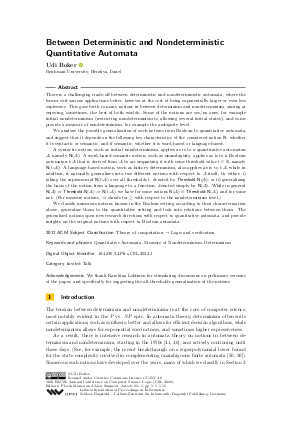@InProceedings{boker:LIPIcs.CSL.2022.1,
author = {Boker, Udi},
title = {{Between Deterministic and Nondeterministic Quantitative Automata}},
booktitle = {30th EACSL Annual Conference on Computer Science Logic (CSL 2022)},
pages = {1:1--1:15},
series = {Leibniz International Proceedings in Informatics (LIPIcs)},
ISBN = {978-3-95977-218-1},
ISSN = {1868-8969},
year = {2022},
volume = {216},
editor = {Manea, Florin and Simpson, Alex},
publisher = {Schloss Dagstuhl -- Leibniz-Zentrum f{\"u}r Informatik},
address = {Dagstuhl, Germany},
URL = {https://drops.dagstuhl.de/entities/document/10.4230/LIPIcs.CSL.2022.1},
URN = {urn:nbn:de:0030-drops-157218},
doi = {10.4230/LIPIcs.CSL.2022.1},
annote = {Keywords: Quantitative Automata, Measure of Nondeterminism, Determinism}
}

 Creative Commons Attribution 4.0 International license
Creative Commons Attribution 4.0 International license



















































